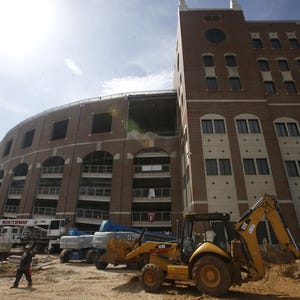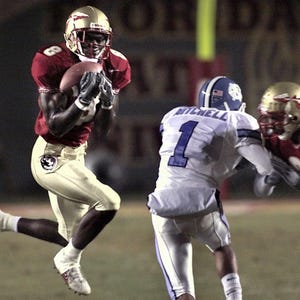http://www.tallahassee.com/story/sports/college/fsu/football/2015/08/13/seminole-boosters-adjust-ticket-priority-policy/31628783/
Seminole Boosters, Inc., is in the middle of a $250 million Champions Campaign, which is a part of the University’s $1 Billion Raise the Torch: The Campaign for Florida State. In this third of three installments on key initiatives in the campaign with "Eyes to the Future," the Democrat details the Boosters' task of generating annual operating revenue for the athletics budget and of updating its ticket priority policy.
Florida State’s season ticket holders provide a consistent and crucial stream of revenue for the athletic department.
They want to find the best seat for their dollar, enjoy exclusive access and amenities, feel comfortable and cheer on winning teams.
Their loyalty also helps Seminole Boosters, Inc., the fund-raising arm of the athletic department, fund the cost of athletics, support the well-being of student-athletes and contribute to campus needs.
“A good, strong athletics program, boosters and season-ticket holders really promotes a good, strong FSU,” said season-ticket holder Grant Mehlich, a 2003 FSU graduate and president of GCM Insurance & Risk Management in Tampa.
“A lot of emphasis is on football but, boy, there is so much that we support in all sorts of sports. Therefore, you are supporting all of the men’s and women’s student-athletes.”
The support of Seminole fans comes from around the state of Florida, and beyond.
Considering that 65 percent of Seminole season ticket holders live more than 150 miles from Tallahassee, their “cost of attendance” is also factored into their purchasing decision.
Seminole Boosters and FSU’s athletics department are working diligently to fund the fans’ appetite for excellence and recognize their dedication by fielding competitive teams and making sure their game experience is satisfying.
The organizations also want to make sure tickets are affordable to suit the needs of fans.
The Boosters generate close to $45 million each year from various sources to fund athletics scholarships, facilities and operations. One important component of those fund raising efforts is the $17.3 million Annual Fund, which is comprised of eight different membership levels ranging from $60 to $25,000.
It rewards donors with ticket and parking benefits via a priority policy for football and basketball – 62 percent of Seminole Boosters’ 18,000 members use the season ticket priority benefits.
The policy currently sets minimum contribution requirements for priority parking and tickets and has been an important tool for generating operating funds for athletics.
In 2014, approximately 11,340 football season ticket holders generated $13.56 million in ticket revenue with $14.2 million in booster contributions tied to those season tickets as part of the ticket priority policy requirements.
While FSU’s ticket policy has worked extremely well over nearly 40 years, it must be adjusted periodically to keep up with inflation and the program’s competitive needs.
Seminole Boosters has studied the policy, and the policies of other schools, and plans to meet with the FSU Athletic Board in September to review their findings. It will ask the Board to approve adjustments to FSU's ticket priority policy beginning with the 2016 football season.
It could be the first adjustment since 2006, when each membership level was increased by 8-percent and the maximum number of tickets each donor level could purchase in priority seating areas of the stadium was decreased.
The only other across-the-board increase since the policy was created in 1976 occurred in 2001 (10-percent and reduced the number of seats any one donor could purchase). Sensitive to the economy, Seminole Boosters delayed discussions for a planned five-year adjustment in 2011.
Another five years have passed and the cost of athletics has increased even more as the program has raised its national ambition for all sports. It also seeks to provide its student-athletes and coaches with more resources, including the “cost of attendance stipend” recently approved by the NCAA.
The Seminoles fund 246.2 scholarships – the maximum allowable for their 20 men’s and women’s sports – with about 500 student-athletes receiving some portion of the athletic scholarship aid. The cost of the stipend for FSU, beyond the cost of a scholarship, is nearly $2 million per year.
While Athletic Director Stan Wilcox implemented a 2-percent budget cut to help offset that line item, athletic costs are projected to continue to rise in the years to come.
Andy Miller, president and CEO of Seminole Boosters, said he’s proud of supporters who want Seminole coaches and student-athletes to have the resources to achieve excellence. He also applauded Wilcox’s steps to be frugal with the budget.
“Royalties from affinity programs, licensing, CollegeTown Phase 1 and Phase 2 and now the Champions Club all generate revenue for the operating budget so that we can be thoughtful of our supporters and only ask when it is needed to achieve our athletic goals,” Miller said.
“Any time we ask the athletic board for approval to adjust the FSU ticket policy, it must be need based. It must be mindful of the market demographics and the great distance between Doak and where our fans live. Our policy must balance what we ask with what benefits the donor enjoys. And it must improve the fan experience.”
Seminole Booster Senior Vice President Jerry Kutz, who has managed the ticket priority policy since 2000 and Vice President Ben Zierden, who managed FSU’s ticket operations for more than a decade before joining Seminole Boosters in 2014, were assigned the task of studying FSU’s policy against other programs.
They set these goals for any new adjustments:
* Generate the revenue necessary to meet the program’s budgetary needs.
* Be as fair as possible to as many season ticket holders as possible.
* Reward loyalty yet inspire new contributors
* Be sensitive to the FSU market and not just to peer schools in the Atlantic Coast Conference and the Southeastern Conference.
* Provide the resources to help fund fan-friendly improvements to Doak, including funding a new scoreboard and paint and repairs to the stadium.
“The one thing that our fans need to be aware of when we talk about ticket priority and making any incremental changes there, part of that is not just going towards helping to increase the operating budget for athletics, it’s also to help with the amenities for the fans who are coming to the stadium,” Wilcox said.
While FSU may have the most displaced fan base in college football, with 65 percent having to make long trips to Tallahassee an expensive proposition, fans always seem to find their way into Doak Campbell Stadium.
They helped the Seminoles place 14th nationally last season in average home attendance at 82,111 (seven sold-out home games.). That average led the ACC in front of Clemson (81,752/15th) and was two spots behind Florida (85,834).
Tallahassee season-ticket holder Jeri Damasiewicz has attended 207 consecutive Seminole games, home and away, since 1999. Jeri and husband Mike – neither attended FSU – are also season ticket holders for basketball and baseball and attend other sports as well.
“We try to support as much as we can because these are real kids,” said Jeri, whose father was a 1958 graduate of FSU. “We’ve found a lot of satisfaction in supporting athletics and getting to know the people involved.”
All season ticket accounts require a Seminole Booster membership contribution of at least $60, which is tax deductible. FSU’s current ticket priority policy requires season ticket holders who wish to purchase more tickets in higher priority areas to give at higher membership levels.
Current published minimum donation requirements in the policy actually fall below the average minimum requirements across the ACC and SEC when comparing comparable seat locations, according to Seminole Boosters.
Many college football programs emulated FSU’s policy for years, but recently have adopted a method that sets minimum per seat requirements by section of the stadium.
Seminole Boosters is considering proposing that approach to the FSU Athletics Board when it meets in September.
“We believe it’s a method our fans will find very equitable and easy to understand,” Zierden said. “And it will generate the revenue to meet the department’s needs.”
Preparing for the future
Generating new revenue for the athletics budget accomplishes one of the three goals of the $250 million Champions Campaign for athletics and will count towards the university’s $1 Billion Raise the Torch: The Campaign for Florida State.
Of course, adjustment to the ticket policy will not be well received by all.
“I get where some people would be a little upset seeing any kind of increases - people never like paying more,” Mehlich said.
“But I think in this instance, from my personal opinion, people don’t mind paying a little bit more if they know it’s going for a great cause. Anytime we say we are going to support a student-athlete, that’s a great cause.”
Seminole Boosters and athletics have provided FSU’s student-athletes with an extensive array of new facilities and construction is already underway to refurbish Doak Campbell Stadium and provide more fan-friendly amenities.
Fisher has returned the Seminoles to the national stage, winning a national title in 2013 and going 29-1 in their last 30 games. FSU is a perennial Top 15 in the Leirfield Director’s Cup for comprehensive excellence.
And, with eyes to the future, Seminole Boosters and the athletic department are determined to take the steps necessary to fund winning programs to drive demand for tickets and a consistent stream of revenue long into the future.
Current Published Minimum Requirements
Area FSU ACC Difference SEC Difference
Priority 1 West $300 $466 -$176 $825 -$525
Priority 2 West $150 $284 -$134 $426 -$276
Priority 1 East $300 $382 -$82 $544 -$244
Priority 2 East $150 $140 $10 $354 -$204
Priority 3 $15 $101 -$86 $109 -$94
*Actual per seat averages are higher
*Does not reflect proposed changes by FSU
2014-15 Annual Revenue (In Millions)
•Tickets: $24
•ACC Distribution: $22.3
•Seminole Boosters: $18.8
•University Fees: $8.5
•Other: $6.7
•Sponsorships: $6.3


Area FSU ACC Difference...
ReplyDeletePriority 1 West $300 $466 -$176....
Dude, that's sad right there. $466 - $300 = $166, not $176!